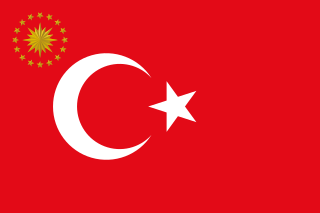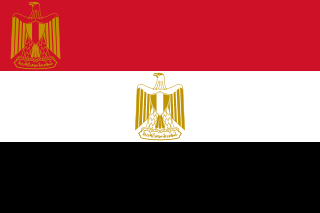
The president of Turkey, officially the president of the Republic of Türkiye, is the head of state and head of government of Turkey. The president directs the executive branch of the national government and is the commander-in-chief of the Turkish military. The president also heads the National Security Council.

The President of the Arab Republic of Egypt is the executive head of state of Egypt and the de facto appointee of the official head of government under the Egyptian Constitution of 2014. Under the various iterations of the Constitution of Egypt following the Egyptian Revolution of 1952, the president is also the supreme commander of the Armed Forces, and head of the executive branch of the Egyptian government. The current president is Field Marshal Abdel Fattah el-Sisi, who has been in office since 8 June 2014.

Azali Assoumani is a Comorian politician and military officer who has served as the President of the Comoros from 2002 to 2006 and again since 2016, except for a brief period in 2019. He became head of state after staging a coup d'état in 1999 and was elected president in 2002, 2016, 2019 and 2024. He also served as Chairperson of the African Union February 2023 to February 2024.

The president of Senegal is the head of state and head of government of Senegal. In accordance with the constitutional reform of 2001 and since a referendum that took place on 20 March 2016, the president is elected for a 5-year term, with a limit of two consecutive terms. The following is a list of presidents of Senegal, since the country gained independence from France in 1960.
A term limit is a legal restriction on the number of terms a person may serve in a particular elected office. When term limits are found in presidential and semi-presidential systems they act as a method of curbing the potential for monopoly, where a leader effectively becomes "president for life". This is intended to protect a republic from becoming a de facto dictatorship. Term limits may be a lifetime limit on the number of terms an officeholder may serve, or a limit on the number of consecutive terms.
A supermajority is a requirement for a proposal to gain a specified level of support which is greater than the threshold of more than one-half used for a simple majority. Supermajority rules in a democracy can help to prevent a majority from eroding fundamental rights of a minority, but they can also hamper efforts to respond to problems and encourage corrupt compromises at times when action is taken. Changes to constitutions, especially those with entrenched clauses, commonly require supermajority support in a legislature. Parliamentary procedure requires that any action of a deliberative assembly that may alter the rights of a minority have a supermajority requirement, such as a two-thirds vote. In consensus democracy the supermajority rule is applied in most cases.

Elections in the Comoros take place within the framework of a multi-party democracy and a presidential system. The President and the majority of the seats in the Assembly of the Union are directly elected.

A constitutional referendum was held in France on 24 September 2000. The proposal to reduce the mandate of the President from seven years to five years was approved by 73.2% of those who voted, but turnout was just 30.2%.

A constitutional referendum was held in Azerbaijan on 18 March 2009. The referendum, initiated by the authoritarian Ilham Aliyev regime, consisted of 29 measures. The most controversial were a measure to abolish presidential term limits, enabling Aliyev to run for president beyond two terms, and a measure to greatly restrict press freedom.

A constitutional referendum was held in Venezuela on 15 February 2009 for voters to approve or reject Amendment No. 1 of the constitution, which abolished term limits for the offices of President, state governors, mayors and National Assembly deputies.

A constitutional referendum was held in the Comoros on 17 May 2009. The constitutional amendments were approved with 93.9% in favour, with a turnout of 51.8%.

The Constitution of Liberia is the supreme law of the Republic of Liberia. The current constitution, which came into force on 6 January 1986, replaced the Liberian Constitution of 1847, which had been in force since the independence of Liberia. Much like the 1847 Constitution, the Constitution creates a system of government heavily modeled on the Federal Government of the United States.

A constitutional referendum was held in the Comoros on 20 October 1996. The proposed amendments would set the presidential term at 6 years, create a unicameral parliament, and limit the authority of the individual islands' parliaments. The proposals were approved by 85% of voters, with a turnout of around 64%.

The Constitution of the Comoros was adopted on 23 December 2001 and last amended in May 2009.

Early presidential elections were held in the Comoros on 24 March 2019 alongside regional elections. A second round would have been held on 21 April if required, but incumbent President Azali Assoumani was re-elected in the first round of voting.

A constitutional referendum was held in Egypt between 20 and 22 April 2019, The main proposed amendments were re-establishing the presidential term to six years, from four previously, and removing the limit of two terms on the president, thereby allowing President Abdel Fattah el-Sisi to potentially remain in power until 2030. The changes were approved by 88.83% of voters who voted, with a 44% turnout.

Parliamentary elections were held in the Comoros on 19 January 2020; in constituencies where no candidate received a majority, a second round was held alongside local elections on 23 February. The elections were boycotted by the main opposition parties, including the two largest parties in the outgoing Assembly, the Union for the Development of the Comoros and Juwa Party, in protest at constitutional reform and political repression, The result was a landslide victory for President Azali Assoumani's Convention for the Renewal of the Comoros, which won 20 of the 24 elected seats.

A constitutional referendum was held in Russia between 25 June and 1 July 2020. President Vladimir Putin proposed the referendum during his address to the Federal Assembly on 15 January 2020. The draft amendments to the constitution were submitted to a referendum in accordance with article 2 of the Law on Amendments to the Constitution. The referendum is legally referred to as an "All-Russian vote", for it is not held in accordance with the Federal Constitutional Law on the Referendum.
The amendments of 2020, which were proposed in January 2020, are the second substantial amendments to the Constitution of Russia of 1993. To introduce these amendments, Vladimir Putin, president of Russia, held a national vote. They were approved on 1 July by a popular vote.












